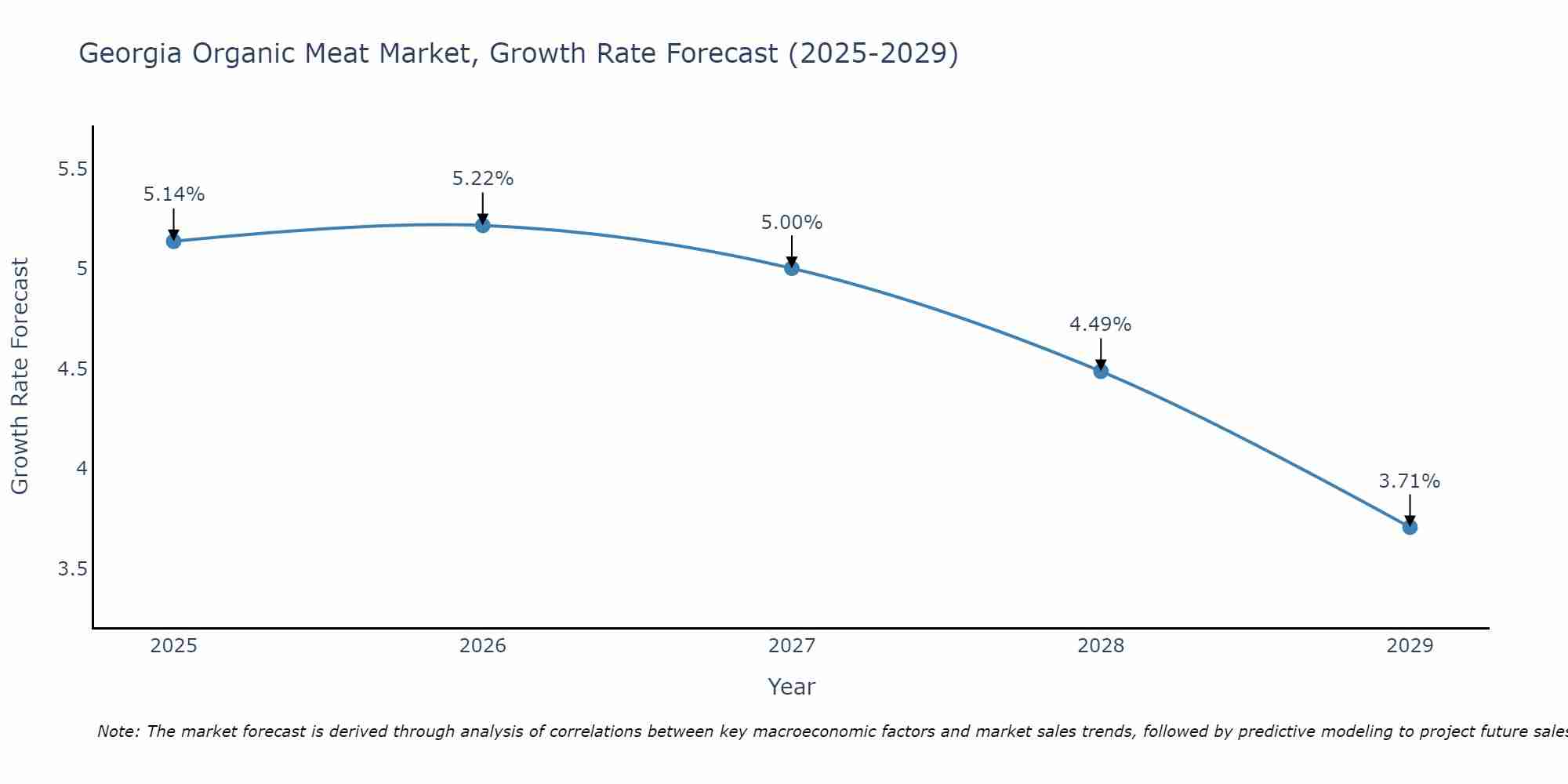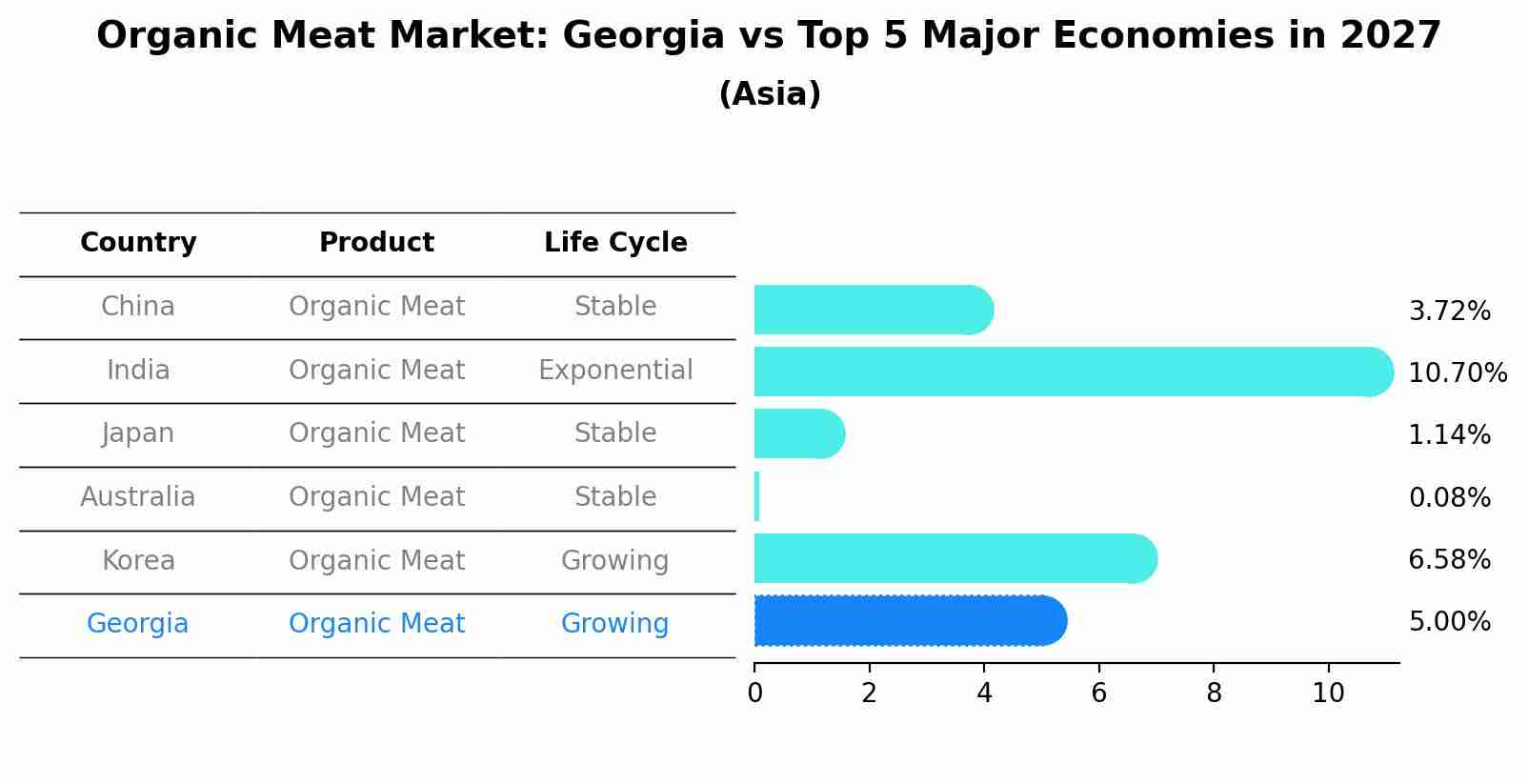Georgia Organic Meat Market (2025-2031) Outlook | Revenue, Size, Forecast, Growth, Industry, Trends, Companies, Share, Value & Analysis
| Product Code: ETC383640 | Publication Date: Aug 2022 | Updated Date: Jul 2025 | Product Type: Market Research Report | |
| Publisher: 6Wresearch | Author: Dhaval Chaurasia | No. of Pages: 75 | No. of Figures: 35 | No. of Tables: 20 |
Georgia Organic Meat Market Size Growth Rate
The Georgia Organic Meat Market is projected to witness mixed growth rate patterns during 2025 to 2029. Starting at 5.14% in 2025, the market peaks at 5.22% in 2026, and settles at 3.71% by 2029.

Organic Meat Market: Georgia vs Top 5 Major Economies in 2027 (Asia)
By 2027, the Organic Meat market in Georgia is anticipated to reach a growth rate of 5.00%, as part of an increasingly competitive Asia region, where China remains at the forefront, supported by India, Japan, Australia and South Korea, driving innovations and market adoption across sectors.

Georgia Organic Meat Market Synopsis
The Georgia organic meat market is a growing sector within the state`s agriculture industry, driven by increasing consumer demand for sustainable and ethically sourced food products. Organic meat producers in Georgia focus on raising animals without the use of antibiotics, hormones, or synthetic pesticides, adhering to strict organic farming practices. The market offers a range of organic meat products, including beef, pork, poultry, and lamb, catering to health-conscious and environmentally aware consumers. Local farmers and ranchers play a significant role in supplying organic meat to Georgia residents through farmers` markets, specialty stores, and online platforms. As consumer awareness of the benefits of organic meat continues to rise, the Georgia organic meat market is poised for further growth and expansion in the coming years.
Georgia Organic Meat Market Trends
In the Georgia organic meat market, a notable trend is the increasing consumer demand for transparency and sustainability. Consumers are becoming more conscious about where their food comes from, how it is produced, and its impact on the environment. This has led to a growing preference for locally sourced and ethically raised organic meats, as well as a desire for certifications that guarantee the authenticity of organic products. Additionally, there is a rising interest in alternative meat products such as plant-based meats, driven by health and environmental concerns. As a result, organic meat producers in Georgia are focusing on promoting their sustainable practices, improving supply chain transparency, and diversifying their product offerings to cater to evolving consumer preferences in the organic meat market.
Georgia Organic Meat Market Challenges
In the Georgia organic meat market, several challenges are faced. These include the limited availability of organic feed for livestock, high production costs leading to higher prices for consumers, the need for stricter regulations to ensure authenticity of organic labels, and the competition from conventional meat products which are often cheaper. Additionally, there is a lack of consumer awareness and understanding of the benefits of organic meat, which hinders market growth. Furthermore, the logistics and distribution network for organic meat products in Georgia are not as developed as in some other regions, making it difficult for producers to reach a wider customer base. Overall, these challenges create barriers for organic meat producers in Georgia to compete effectively in the market.
Georgia Organic Meat Market Investment Opportunities
The Georgia Organic Meat Market presents promising investment opportunities due to the increasing consumer demand for organic and ethically sourced products. With a growing awareness of health and environmental concerns, there is a rising preference for organic meat products that are free from antibiotics, hormones, and synthetic additives. Investors can consider opportunities in organic meat production, processing facilities, distribution networks, and retail outlets to capitalize on this trend. Collaborating with local farmers and ranchers to support sustainable and organic farming practices can also be a viable investment strategy in the Georgia market. Additionally, investing in marketing and branding efforts to differentiate the organic meat products and target the health-conscious consumer segment can further enhance the potential returns in this market segment.
Jordan Agar Market Government Policies
The government policies related to the Georgia Organic Meat Market primarily focus on ensuring compliance with organic certification standards set by the United States Department of Agriculture (USDA). Farmers and producers in Georgia must adhere to the USDA`s National Organic Program regulations, which include restrictions on the use of synthetic chemicals, pesticides, and genetically modified organisms in livestock production. Additionally, the Georgia Department of Agriculture oversees the enforcement of these standards through inspections and certification processes to maintain the integrity of organic labeling within the state. Government initiatives also support organic farming practices through financial incentives, educational programs, and research grants to promote the growth of the organic meat market in Georgia while ensuring consumer confidence in the authenticity and quality of organic products.
Georgia Organic Meat Market Future Outlook
The future outlook for the Georgia Organic Meat Market appears to be promising, driven by increasing consumer awareness and demand for organic, sustainable, and ethically-produced food products. With a growing emphasis on health, environmental sustainability, and animal welfare, consumers are increasingly seeking out organic meat options in Georgia. Furthermore, the trend towards supporting local farmers and businesses is also expected to boost the market for organic meat in the state. As more consumers prioritize transparency in the food supply chain and seek out high-quality, natural products, the Georgia Organic Meat Market is likely to experience steady growth in the coming years. It will be important for market players to continue to innovate, maintain high standards of quality, and effectively communicate the benefits of organic meat to capitalize on this growing trend.
Key Highlights of the Report:
- Georgia Organic Meat Market Outlook
- Market Size of Georgia Organic Meat Market, 2024
- Forecast of Georgia Organic Meat Market, 2031
- Historical Data and Forecast of Georgia Organic Meat Revenues & Volume for the Period 2021 - 2031
- Georgia Organic Meat Market Trend Evolution
- Georgia Organic Meat Market Drivers and Challenges
- Georgia Organic Meat Price Trends
- Georgia Organic Meat Porter's Five Forces
- Georgia Organic Meat Industry Life Cycle
- Historical Data and Forecast of Georgia Organic Meat Market Revenues & Volume By Type for the Period 2021 - 2031
- Historical Data and Forecast of Georgia Organic Meat Market Revenues & Volume By Poultry for the Period 2021 - 2031
- Historical Data and Forecast of Georgia Organic Meat Market Revenues & Volume By Beef for the Period 2021 - 2031
- Historical Data and Forecast of Georgia Organic Meat Market Revenues & Volume By Pork for the Period 2021 - 2031
- Historical Data and Forecast of Georgia Organic Meat Market Revenues & Volume By Others for the Period 2021 - 2031
- Historical Data and Forecast of Georgia Organic Meat Market Revenues & Volume By Application for the Period 2021 - 2031
- Historical Data and Forecast of Georgia Organic Meat Market Revenues & Volume By Food Services for the Period 2021 - 2031
- Historical Data and Forecast of Georgia Organic Meat Market Revenues & Volume By Retail for the Period 2021 - 2031
- Historical Data and Forecast of Georgia Organic Meat Market Revenues & Volume By Distribution Channel for the Period 2021 - 2031
- Historical Data and Forecast of Georgia Organic Meat Market Revenues & Volume By B2C for the Period 2021 - 2031
- Historical Data and Forecast of Georgia Organic Meat Market Revenues & Volume By B2B for the Period 2021 - 2031
- Georgia Organic Meat Import Export Trade Statistics
- Market Opportunity Assessment By Type
- Market Opportunity Assessment By Application
- Market Opportunity Assessment By Distribution Channel
- Georgia Organic Meat Top Companies Market Share
- Georgia Organic Meat Competitive Benchmarking By Technical and Operational Parameters
- Georgia Organic Meat Company Profiles
- Georgia Organic Meat Key Strategic Recommendations
Frequently Asked Questions About the Market Study (FAQs):
- Single User License$ 1,995
- Department License$ 2,400
- Site License$ 3,120
- Global License$ 3,795
Search
Thought Leadership and Analyst Meet
Our Clients
Related Reports
- Afghanistan Apparel Market (2026-2032) | Growth, Outlook, Industry, Segmentation, Forecast, Size, Companies, Trends, Value, Share, Analysis & Revenue
- Canada Oil and Gas Market (2026-2032) | Share, Segmentation, Value, Industry, Trends, Forecast, Analysis, Size & Revenue, Growth, Competitive Landscape, Outlook, Companies
- Germany Breakfast Food Market (2026-2032) | Industry, Share, Growth, Size, Companies, Value, Analysis, Revenue, Trends, Forecast & Outlook
- Australia Briquette Market (2025-2031) | Growth, Size, Revenue, Forecast, Analysis, Trends, Value, Share, Industry & Companies
- Vietnam System Integrator Market (2025-2031) | Size, Companies, Analysis, Industry, Value, Forecast, Growth, Trends, Revenue & Share
- ASEAN and Thailand Brain Health Supplements Market (2025-2031) | Strategy, Consumer Insights, Analysis, Investment Trends, Opportunities, Growth, Size, Share, Industry, Revenue, Segments, Value, Segmentation, Supply, Forecast, Restraints, Outlook, Competition, Drivers, Trends, Demand, Pricing Analysis, Competitive, Strategic Insights, Companies, Challenges
- ASEAN Bearings Market (2025-2031) | Strategy, Consumer Insights, Analysis, Investment Trends, Opportunities, Growth, Size, Share, Industry, Revenue, Segments, Value, Segmentation, Supply, Forecast, Restraints, Outlook, Competition, Drivers, Trends, Demand, Pricing Analysis, Competitive, Strategic Insights, Companies, Challenges
- Europe Flooring Market (2025-2031) | Outlook, Share, Industry, Trends, Forecast, Companies, Revenue, Size, Analysis, Growth & Value
- Saudi Arabia Manlift Market (2025-2031) | Outlook, Size, Growth, Trends, Companies, Industry, Revenue, Value, Share, Forecast & Analysis
- Uganda Excavator, Crane, and Wheel Loaders Market (2025-2031) | Strategy, Consumer Insights, Analysis, Investment Trends, Opportunities, Growth, Size, Share, Industry, Revenue, Segments, Value, Segmentation, Supply, Forecast, Restraints, Outlook, Competition, Drivers, Trends, Demand, Pricing Analysis, Competitive, Strategic Insights, Companies, Challenges
Industry Events and Analyst Meet
Whitepaper
- Middle East & Africa Commercial Security Market Click here to view more.
- Middle East & Africa Fire Safety Systems & Equipment Market Click here to view more.
- GCC Drone Market Click here to view more.
- Middle East Lighting Fixture Market Click here to view more.
- GCC Physical & Perimeter Security Market Click here to view more.
6WResearch In News
- Doha a strategic location for EV manufacturing hub: IPA Qatar
- Demand for luxury TVs surging in the GCC, says Samsung
- Empowering Growth: The Thriving Journey of Bangladesh’s Cable Industry
- Demand for luxury TVs surging in the GCC, says Samsung
- Video call with a traditional healer? Once unthinkable, it’s now common in South Africa
- Intelligent Buildings To Smooth GCC’s Path To Net Zero


















